ENTREPRENEURSHIP AND SMALL BUSINESS MANAGEMENT - University Report
VerifiedAdded on 2020/09/03
|14
|4244
|52
Report
AI Summary
This report delves into the core concepts of entrepreneurship and small business management, exploring various types of entrepreneurial ventures, including small business, scalable start-ups, and social entrepreneurship, and their relationship with different typologies of entrepreneurs such as trading, manufacturing, innovating, research, and copycat entrepreneurs. The report highlights the similarities and differences between social and lifestyle business ventures, contrasting their approaches to profit, social impact, and market strategies. It also examines the impact of micro-business organizations on the economy, emphasizing their contributions to growth, job creation, export, and productivity. Furthermore, the importance of small business organizations in fostering competitiveness is discussed. Finally, the report briefly touches upon the characteristics, traits, and skills of entrepreneurs, and how their backgrounds and experiences can influence their entrepreneurial journey.

ENTREPRENEURSHIP
AND SMALL BUSINESS
MANAGEMENT
AND SMALL BUSINESS
MANAGEMENT
Paraphrase This Document
Need a fresh take? Get an instant paraphrase of this document with our AI Paraphraser
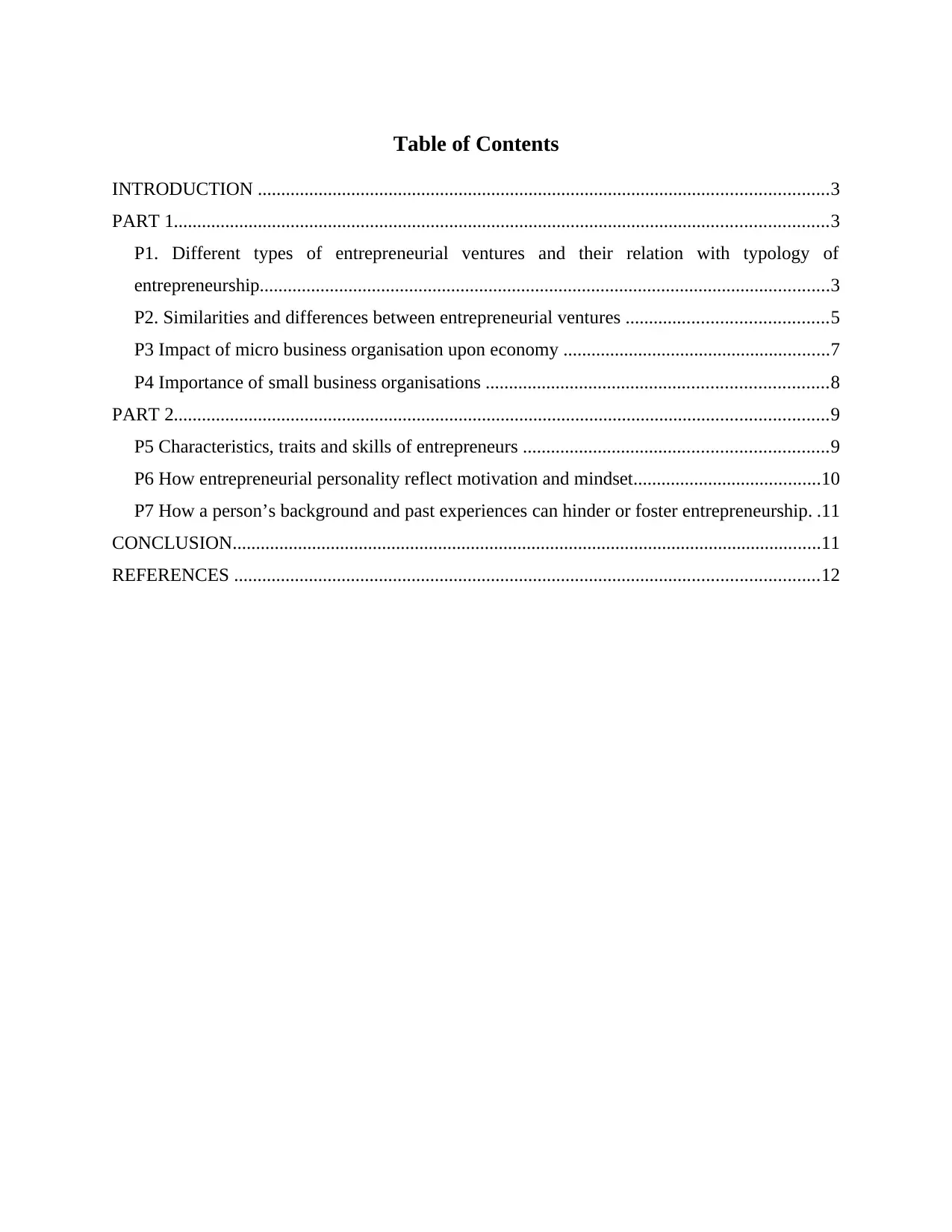
Table of Contents
INTRODUCTION ..........................................................................................................................3
PART 1............................................................................................................................................3
P1. Different types of entrepreneurial ventures and their relation with typology of
entrepreneurship..........................................................................................................................3
P2. Similarities and differences between entrepreneurial ventures ...........................................5
P3 Impact of micro business organisation upon economy .........................................................7
P4 Importance of small business organisations .........................................................................8
PART 2............................................................................................................................................9
P5 Characteristics, traits and skills of entrepreneurs .................................................................9
P6 How entrepreneurial personality reflect motivation and mindset........................................10
P7 How a person’s background and past experiences can hinder or foster entrepreneurship. .11
CONCLUSION..............................................................................................................................11
REFERENCES .............................................................................................................................12
INTRODUCTION ..........................................................................................................................3
PART 1............................................................................................................................................3
P1. Different types of entrepreneurial ventures and their relation with typology of
entrepreneurship..........................................................................................................................3
P2. Similarities and differences between entrepreneurial ventures ...........................................5
P3 Impact of micro business organisation upon economy .........................................................7
P4 Importance of small business organisations .........................................................................8
PART 2............................................................................................................................................9
P5 Characteristics, traits and skills of entrepreneurs .................................................................9
P6 How entrepreneurial personality reflect motivation and mindset........................................10
P7 How a person’s background and past experiences can hinder or foster entrepreneurship. .11
CONCLUSION..............................................................................................................................11
REFERENCES .............................................................................................................................12
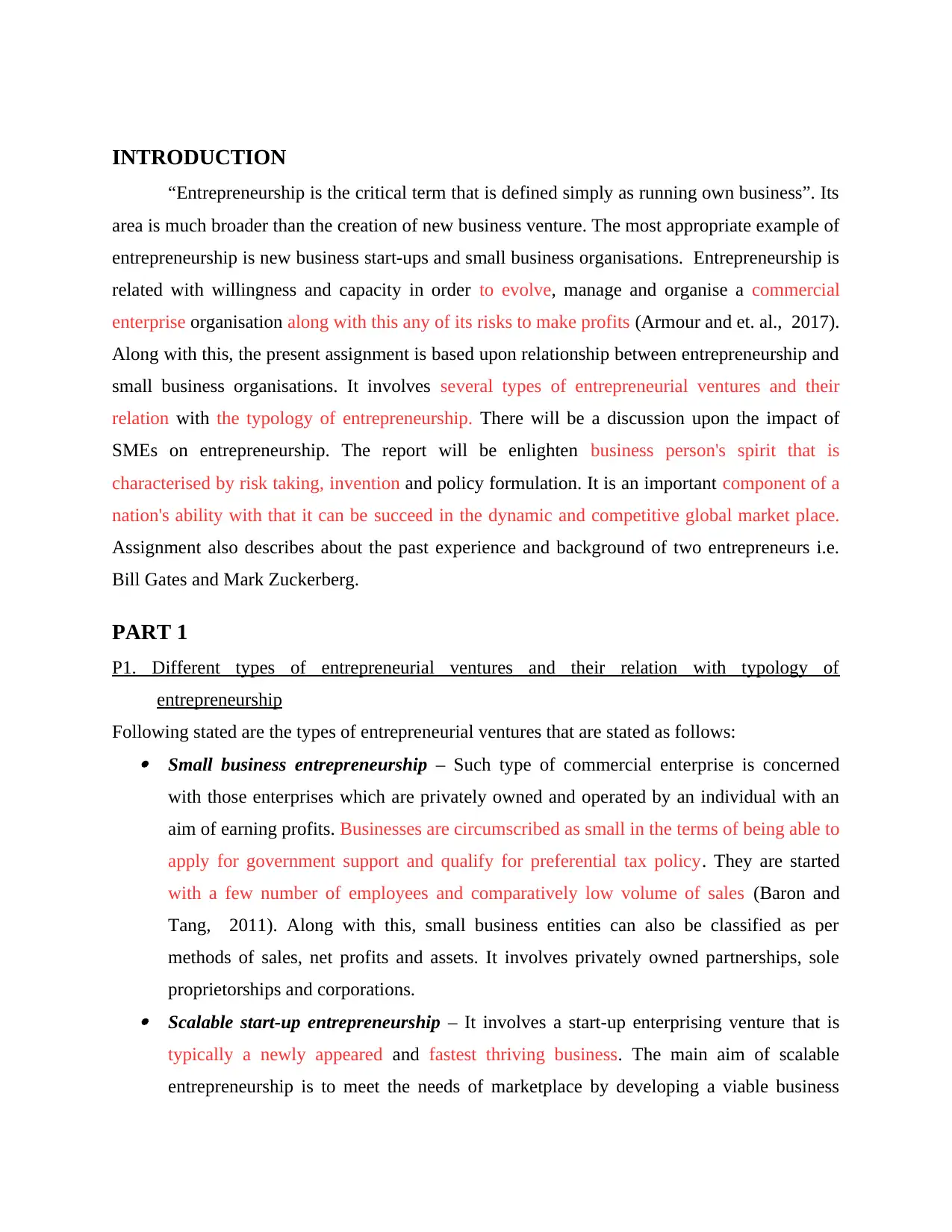
INTRODUCTION
“Entrepreneurship is the critical term that is defined simply as running own business”. Its
area is much broader than the creation of new business venture. The most appropriate example of
entrepreneurship is new business start-ups and small business organisations. Entrepreneurship is
related with willingness and capacity in order to evolve, manage and organise a commercial
enterprise organisation along with this any of its risks to make profits (Armour and et. al., 2017).
Along with this, the present assignment is based upon relationship between entrepreneurship and
small business organisations. It involves several types of entrepreneurial ventures and their
relation with the typology of entrepreneurship. There will be a discussion upon the impact of
SMEs on entrepreneurship. The report will be enlighten business person's spirit that is
characterised by risk taking, invention and policy formulation. It is an important component of a
nation's ability with that it can be succeed in the dynamic and competitive global market place.
Assignment also describes about the past experience and background of two entrepreneurs i.e.
Bill Gates and Mark Zuckerberg.
PART 1
P1. Different types of entrepreneurial ventures and their relation with typology of
entrepreneurship
Following stated are the types of entrepreneurial ventures that are stated as follows: Small business entrepreneurship – Such type of commercial enterprise is concerned
with those enterprises which are privately owned and operated by an individual with an
aim of earning profits. Businesses are circumscribed as small in the terms of being able to
apply for government support and qualify for preferential tax policy. They are started
with a few number of employees and comparatively low volume of sales (Baron and
Tang, 2011). Along with this, small business entities can also be classified as per
methods of sales, net profits and assets. It involves privately owned partnerships, sole
proprietorships and corporations. Scalable start-up entrepreneurship – It involves a start-up enterprising venture that is
typically a newly appeared and fastest thriving business. The main aim of scalable
entrepreneurship is to meet the needs of marketplace by developing a viable business
“Entrepreneurship is the critical term that is defined simply as running own business”. Its
area is much broader than the creation of new business venture. The most appropriate example of
entrepreneurship is new business start-ups and small business organisations. Entrepreneurship is
related with willingness and capacity in order to evolve, manage and organise a commercial
enterprise organisation along with this any of its risks to make profits (Armour and et. al., 2017).
Along with this, the present assignment is based upon relationship between entrepreneurship and
small business organisations. It involves several types of entrepreneurial ventures and their
relation with the typology of entrepreneurship. There will be a discussion upon the impact of
SMEs on entrepreneurship. The report will be enlighten business person's spirit that is
characterised by risk taking, invention and policy formulation. It is an important component of a
nation's ability with that it can be succeed in the dynamic and competitive global market place.
Assignment also describes about the past experience and background of two entrepreneurs i.e.
Bill Gates and Mark Zuckerberg.
PART 1
P1. Different types of entrepreneurial ventures and their relation with typology of
entrepreneurship
Following stated are the types of entrepreneurial ventures that are stated as follows: Small business entrepreneurship – Such type of commercial enterprise is concerned
with those enterprises which are privately owned and operated by an individual with an
aim of earning profits. Businesses are circumscribed as small in the terms of being able to
apply for government support and qualify for preferential tax policy. They are started
with a few number of employees and comparatively low volume of sales (Baron and
Tang, 2011). Along with this, small business entities can also be classified as per
methods of sales, net profits and assets. It involves privately owned partnerships, sole
proprietorships and corporations. Scalable start-up entrepreneurship – It involves a start-up enterprising venture that is
typically a newly appeared and fastest thriving business. The main aim of scalable
entrepreneurship is to meet the needs of marketplace by developing a viable business
⊘ This is a preview!⊘
Do you want full access?
Subscribe today to unlock all pages.

Trusted by 1+ million students worldwide
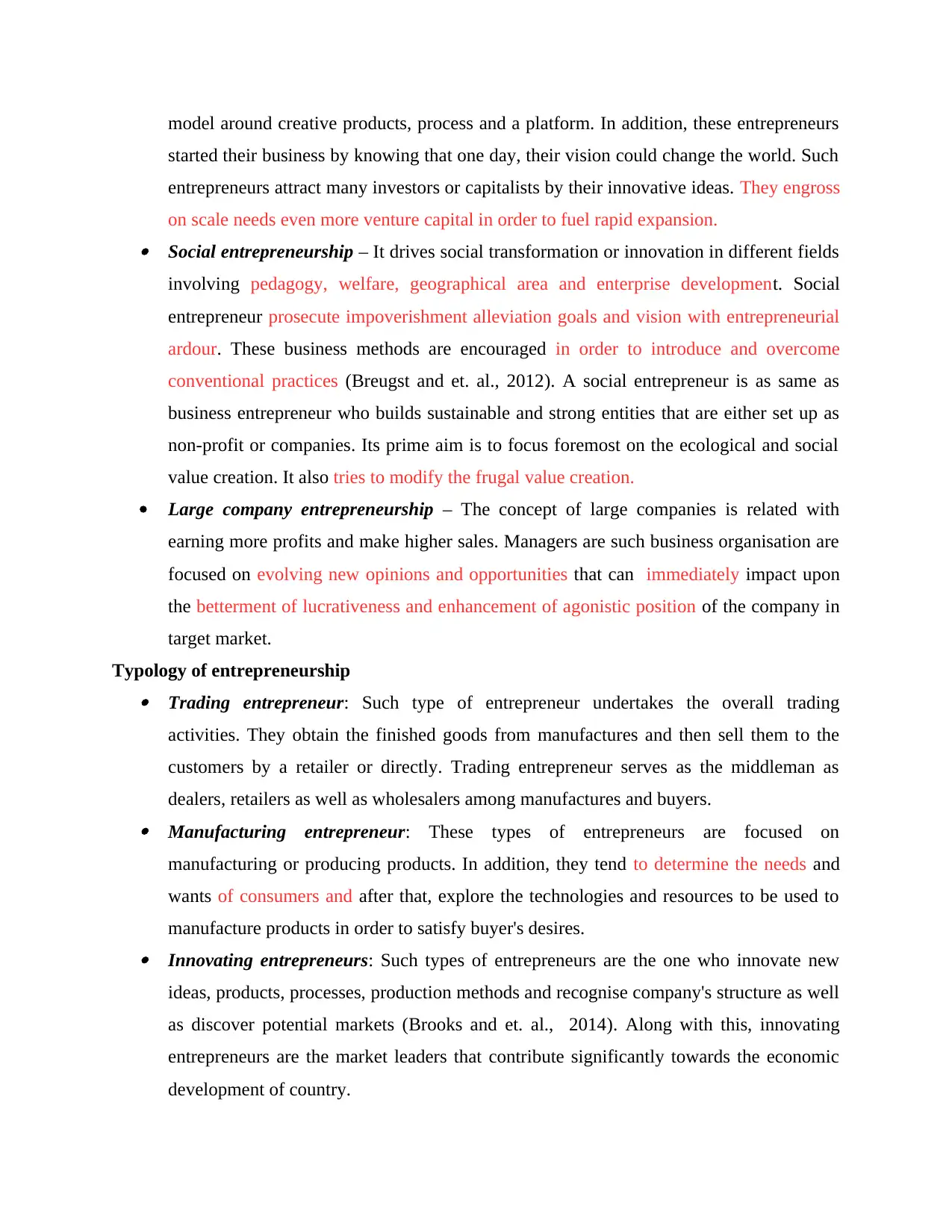
model around creative products, process and a platform. In addition, these entrepreneurs
started their business by knowing that one day, their vision could change the world. Such
entrepreneurs attract many investors or capitalists by their innovative ideas. They engross
on scale needs even more venture capital in order to fuel rapid expansion. Social entrepreneurship – It drives social transformation or innovation in different fields
involving pedagogy, welfare, geographical area and enterprise development. Social
entrepreneur prosecute impoverishment alleviation goals and vision with entrepreneurial
ardour. These business methods are encouraged in order to introduce and overcome
conventional practices (Breugst and et. al., 2012). A social entrepreneur is as same as
business entrepreneur who builds sustainable and strong entities that are either set up as
non-profit or companies. Its prime aim is to focus foremost on the ecological and social
value creation. It also tries to modify the frugal value creation.
Large company entrepreneurship – The concept of large companies is related with
earning more profits and make higher sales. Managers are such business organisation are
focused on evolving new opinions and opportunities that can immediately impact upon
the betterment of lucrativeness and enhancement of agonistic position of the company in
target market.
Typology of entrepreneurship Trading entrepreneur: Such type of entrepreneur undertakes the overall trading
activities. They obtain the finished goods from manufactures and then sell them to the
customers by a retailer or directly. Trading entrepreneur serves as the middleman as
dealers, retailers as well as wholesalers among manufactures and buyers. Manufacturing entrepreneur: These types of entrepreneurs are focused on
manufacturing or producing products. In addition, they tend to determine the needs and
wants of consumers and after that, explore the technologies and resources to be used to
manufacture products in order to satisfy buyer's desires. Innovating entrepreneurs: Such types of entrepreneurs are the one who innovate new
ideas, products, processes, production methods and recognise company's structure as well
as discover potential markets (Brooks and et. al., 2014). Along with this, innovating
entrepreneurs are the market leaders that contribute significantly towards the economic
development of country.
started their business by knowing that one day, their vision could change the world. Such
entrepreneurs attract many investors or capitalists by their innovative ideas. They engross
on scale needs even more venture capital in order to fuel rapid expansion. Social entrepreneurship – It drives social transformation or innovation in different fields
involving pedagogy, welfare, geographical area and enterprise development. Social
entrepreneur prosecute impoverishment alleviation goals and vision with entrepreneurial
ardour. These business methods are encouraged in order to introduce and overcome
conventional practices (Breugst and et. al., 2012). A social entrepreneur is as same as
business entrepreneur who builds sustainable and strong entities that are either set up as
non-profit or companies. Its prime aim is to focus foremost on the ecological and social
value creation. It also tries to modify the frugal value creation.
Large company entrepreneurship – The concept of large companies is related with
earning more profits and make higher sales. Managers are such business organisation are
focused on evolving new opinions and opportunities that can immediately impact upon
the betterment of lucrativeness and enhancement of agonistic position of the company in
target market.
Typology of entrepreneurship Trading entrepreneur: Such type of entrepreneur undertakes the overall trading
activities. They obtain the finished goods from manufactures and then sell them to the
customers by a retailer or directly. Trading entrepreneur serves as the middleman as
dealers, retailers as well as wholesalers among manufactures and buyers. Manufacturing entrepreneur: These types of entrepreneurs are focused on
manufacturing or producing products. In addition, they tend to determine the needs and
wants of consumers and after that, explore the technologies and resources to be used to
manufacture products in order to satisfy buyer's desires. Innovating entrepreneurs: Such types of entrepreneurs are the one who innovate new
ideas, products, processes, production methods and recognise company's structure as well
as discover potential markets (Brooks and et. al., 2014). Along with this, innovating
entrepreneurs are the market leaders that contribute significantly towards the economic
development of country.
Paraphrase This Document
Need a fresh take? Get an instant paraphrase of this document with our AI Paraphraser
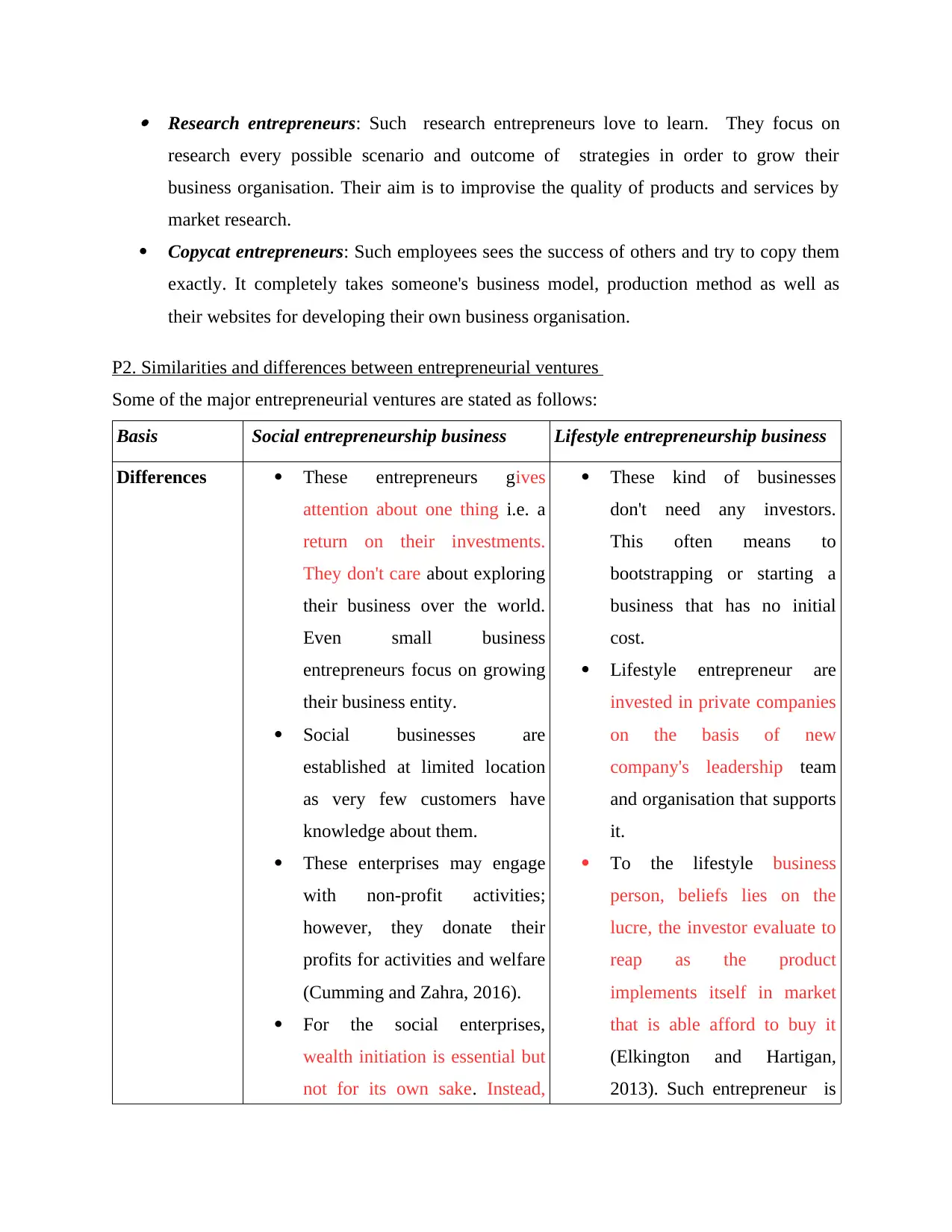
Research entrepreneurs: Such research entrepreneurs love to learn. They focus on
research every possible scenario and outcome of strategies in order to grow their
business organisation. Their aim is to improvise the quality of products and services by
market research.
Copycat entrepreneurs: Such employees sees the success of others and try to copy them
exactly. It completely takes someone's business model, production method as well as
their websites for developing their own business organisation.
P2. Similarities and differences between entrepreneurial ventures
Some of the major entrepreneurial ventures are stated as follows:
Basis Social entrepreneurship business Lifestyle entrepreneurship business
Differences These entrepreneurs gives
attention about one thing i.e. a
return on their investments.
They don't care about exploring
their business over the world.
Even small business
entrepreneurs focus on growing
their business entity.
Social businesses are
established at limited location
as very few customers have
knowledge about them.
These enterprises may engage
with non-profit activities;
however, they donate their
profits for activities and welfare
(Cumming and Zahra, 2016).
For the social enterprises,
wealth initiation is essential but
not for its own sake. Instead,
These kind of businesses
don't need any investors.
This often means to
bootstrapping or starting a
business that has no initial
cost.
Lifestyle entrepreneur are
invested in private companies
on the basis of new
company's leadership team
and organisation that supports
it.
To the lifestyle business
person, beliefs lies on the
lucre, the investor evaluate to
reap as the product
implements itself in market
that is able afford to buy it
(Elkington and Hartigan,
2013). Such entrepreneur is
research every possible scenario and outcome of strategies in order to grow their
business organisation. Their aim is to improvise the quality of products and services by
market research.
Copycat entrepreneurs: Such employees sees the success of others and try to copy them
exactly. It completely takes someone's business model, production method as well as
their websites for developing their own business organisation.
P2. Similarities and differences between entrepreneurial ventures
Some of the major entrepreneurial ventures are stated as follows:
Basis Social entrepreneurship business Lifestyle entrepreneurship business
Differences These entrepreneurs gives
attention about one thing i.e. a
return on their investments.
They don't care about exploring
their business over the world.
Even small business
entrepreneurs focus on growing
their business entity.
Social businesses are
established at limited location
as very few customers have
knowledge about them.
These enterprises may engage
with non-profit activities;
however, they donate their
profits for activities and welfare
(Cumming and Zahra, 2016).
For the social enterprises,
wealth initiation is essential but
not for its own sake. Instead,
These kind of businesses
don't need any investors.
This often means to
bootstrapping or starting a
business that has no initial
cost.
Lifestyle entrepreneur are
invested in private companies
on the basis of new
company's leadership team
and organisation that supports
it.
To the lifestyle business
person, beliefs lies on the
lucre, the investor evaluate to
reap as the product
implements itself in market
that is able afford to buy it
(Elkington and Hartigan,
2013). Such entrepreneur is
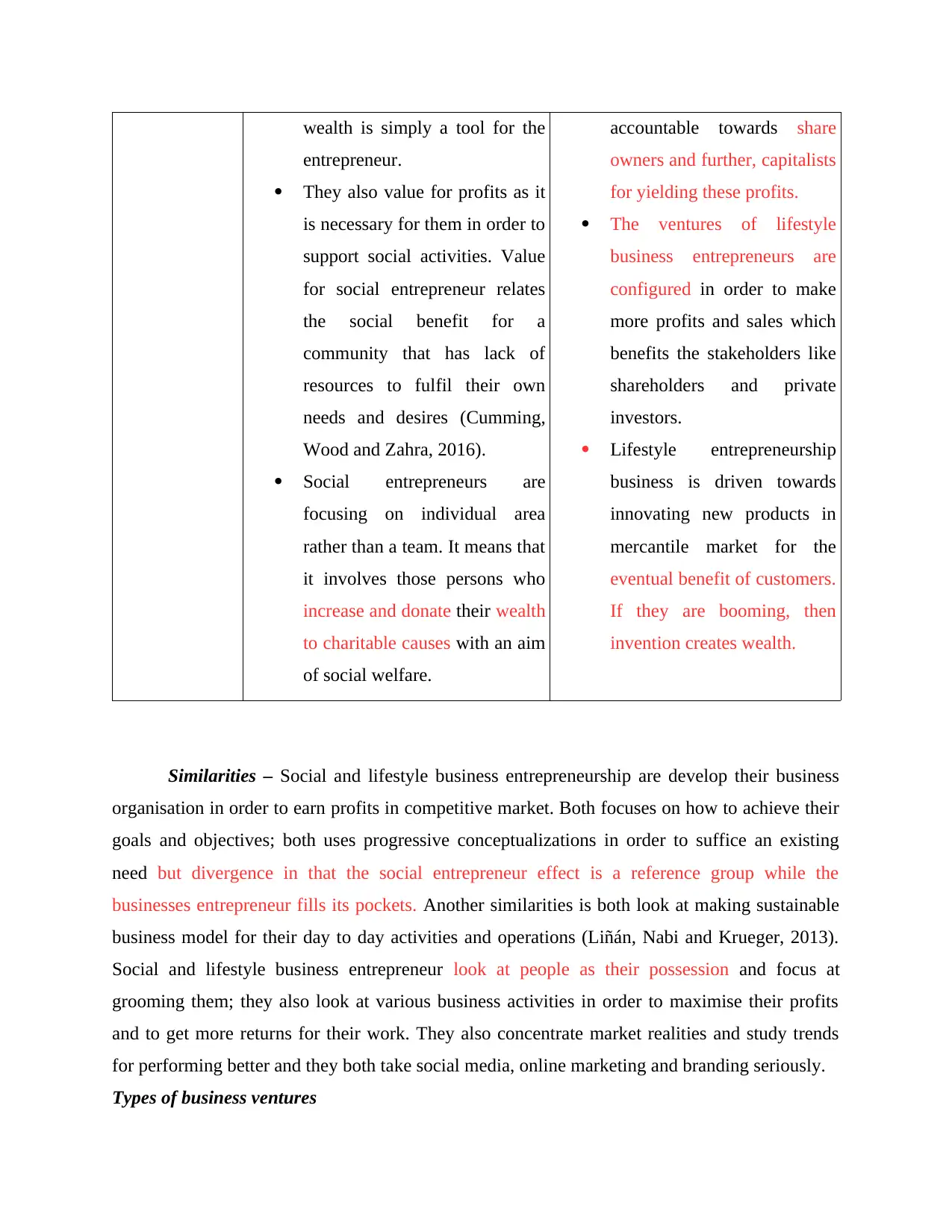
wealth is simply a tool for the
entrepreneur.
They also value for profits as it
is necessary for them in order to
support social activities. Value
for social entrepreneur relates
the social benefit for a
community that has lack of
resources to fulfil their own
needs and desires (Cumming,
Wood and Zahra, 2016).
Social entrepreneurs are
focusing on individual area
rather than a team. It means that
it involves those persons who
increase and donate their wealth
to charitable causes with an aim
of social welfare.
accountable towards share
owners and further, capitalists
for yielding these profits.
The ventures of lifestyle
business entrepreneurs are
configured in order to make
more profits and sales which
benefits the stakeholders like
shareholders and private
investors.
Lifestyle entrepreneurship
business is driven towards
innovating new products in
mercantile market for the
eventual benefit of customers.
If they are booming, then
invention creates wealth.
Similarities – Social and lifestyle business entrepreneurship are develop their business
organisation in order to earn profits in competitive market. Both focuses on how to achieve their
goals and objectives; both uses progressive conceptualizations in order to suffice an existing
need but divergence in that the social entrepreneur effect is a reference group while the
businesses entrepreneur fills its pockets. Another similarities is both look at making sustainable
business model for their day to day activities and operations (Liñán, Nabi and Krueger, 2013).
Social and lifestyle business entrepreneur look at people as their possession and focus at
grooming them; they also look at various business activities in order to maximise their profits
and to get more returns for their work. They also concentrate market realities and study trends
for performing better and they both take social media, online marketing and branding seriously.
Types of business ventures
entrepreneur.
They also value for profits as it
is necessary for them in order to
support social activities. Value
for social entrepreneur relates
the social benefit for a
community that has lack of
resources to fulfil their own
needs and desires (Cumming,
Wood and Zahra, 2016).
Social entrepreneurs are
focusing on individual area
rather than a team. It means that
it involves those persons who
increase and donate their wealth
to charitable causes with an aim
of social welfare.
accountable towards share
owners and further, capitalists
for yielding these profits.
The ventures of lifestyle
business entrepreneurs are
configured in order to make
more profits and sales which
benefits the stakeholders like
shareholders and private
investors.
Lifestyle entrepreneurship
business is driven towards
innovating new products in
mercantile market for the
eventual benefit of customers.
If they are booming, then
invention creates wealth.
Similarities – Social and lifestyle business entrepreneurship are develop their business
organisation in order to earn profits in competitive market. Both focuses on how to achieve their
goals and objectives; both uses progressive conceptualizations in order to suffice an existing
need but divergence in that the social entrepreneur effect is a reference group while the
businesses entrepreneur fills its pockets. Another similarities is both look at making sustainable
business model for their day to day activities and operations (Liñán, Nabi and Krueger, 2013).
Social and lifestyle business entrepreneur look at people as their possession and focus at
grooming them; they also look at various business activities in order to maximise their profits
and to get more returns for their work. They also concentrate market realities and study trends
for performing better and they both take social media, online marketing and branding seriously.
Types of business ventures
⊘ This is a preview!⊘
Do you want full access?
Subscribe today to unlock all pages.

Trusted by 1+ million students worldwide
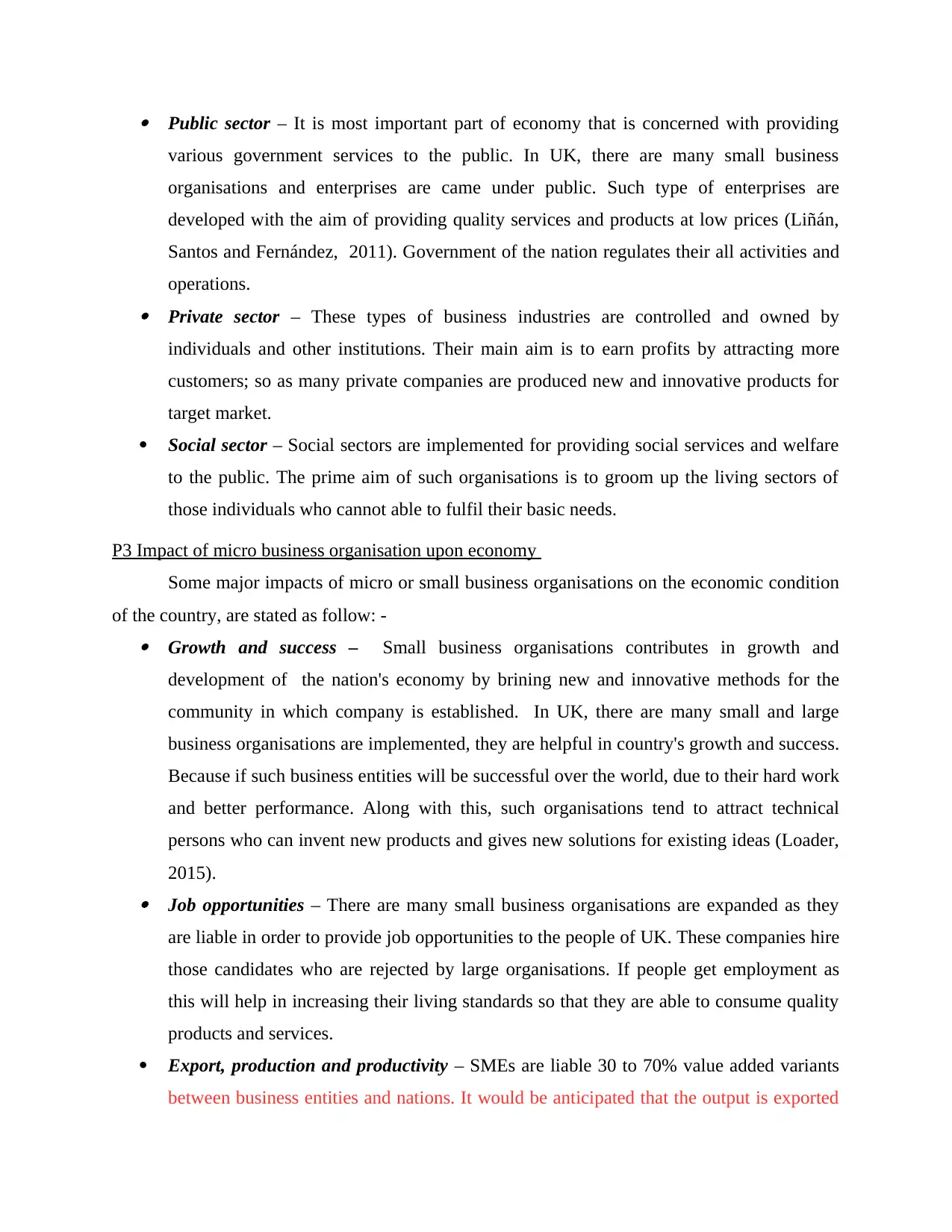
Public sector – It is most important part of economy that is concerned with providing
various government services to the public. In UK, there are many small business
organisations and enterprises are came under public. Such type of enterprises are
developed with the aim of providing quality services and products at low prices (Liñán,
Santos and Fernández, 2011). Government of the nation regulates their all activities and
operations. Private sector – These types of business industries are controlled and owned by
individuals and other institutions. Their main aim is to earn profits by attracting more
customers; so as many private companies are produced new and innovative products for
target market.
Social sector – Social sectors are implemented for providing social services and welfare
to the public. The prime aim of such organisations is to groom up the living sectors of
those individuals who cannot able to fulfil their basic needs.
P3 Impact of micro business organisation upon economy
Some major impacts of micro or small business organisations on the economic condition
of the country, are stated as follow: - Growth and success – Small business organisations contributes in growth and
development of the nation's economy by brining new and innovative methods for the
community in which company is established. In UK, there are many small and large
business organisations are implemented, they are helpful in country's growth and success.
Because if such business entities will be successful over the world, due to their hard work
and better performance. Along with this, such organisations tend to attract technical
persons who can invent new products and gives new solutions for existing ideas (Loader,
2015). Job opportunities – There are many small business organisations are expanded as they
are liable in order to provide job opportunities to the people of UK. These companies hire
those candidates who are rejected by large organisations. If people get employment as
this will help in increasing their living standards so that they are able to consume quality
products and services.
Export, production and productivity – SMEs are liable 30 to 70% value added variants
between business entities and nations. It would be anticipated that the output is exported
various government services to the public. In UK, there are many small business
organisations and enterprises are came under public. Such type of enterprises are
developed with the aim of providing quality services and products at low prices (Liñán,
Santos and Fernández, 2011). Government of the nation regulates their all activities and
operations. Private sector – These types of business industries are controlled and owned by
individuals and other institutions. Their main aim is to earn profits by attracting more
customers; so as many private companies are produced new and innovative products for
target market.
Social sector – Social sectors are implemented for providing social services and welfare
to the public. The prime aim of such organisations is to groom up the living sectors of
those individuals who cannot able to fulfil their basic needs.
P3 Impact of micro business organisation upon economy
Some major impacts of micro or small business organisations on the economic condition
of the country, are stated as follow: - Growth and success – Small business organisations contributes in growth and
development of the nation's economy by brining new and innovative methods for the
community in which company is established. In UK, there are many small and large
business organisations are implemented, they are helpful in country's growth and success.
Because if such business entities will be successful over the world, due to their hard work
and better performance. Along with this, such organisations tend to attract technical
persons who can invent new products and gives new solutions for existing ideas (Loader,
2015). Job opportunities – There are many small business organisations are expanded as they
are liable in order to provide job opportunities to the people of UK. These companies hire
those candidates who are rejected by large organisations. If people get employment as
this will help in increasing their living standards so that they are able to consume quality
products and services.
Export, production and productivity – SMEs are liable 30 to 70% value added variants
between business entities and nations. It would be anticipated that the output is exported
Paraphrase This Document
Need a fresh take? Get an instant paraphrase of this document with our AI Paraphraser
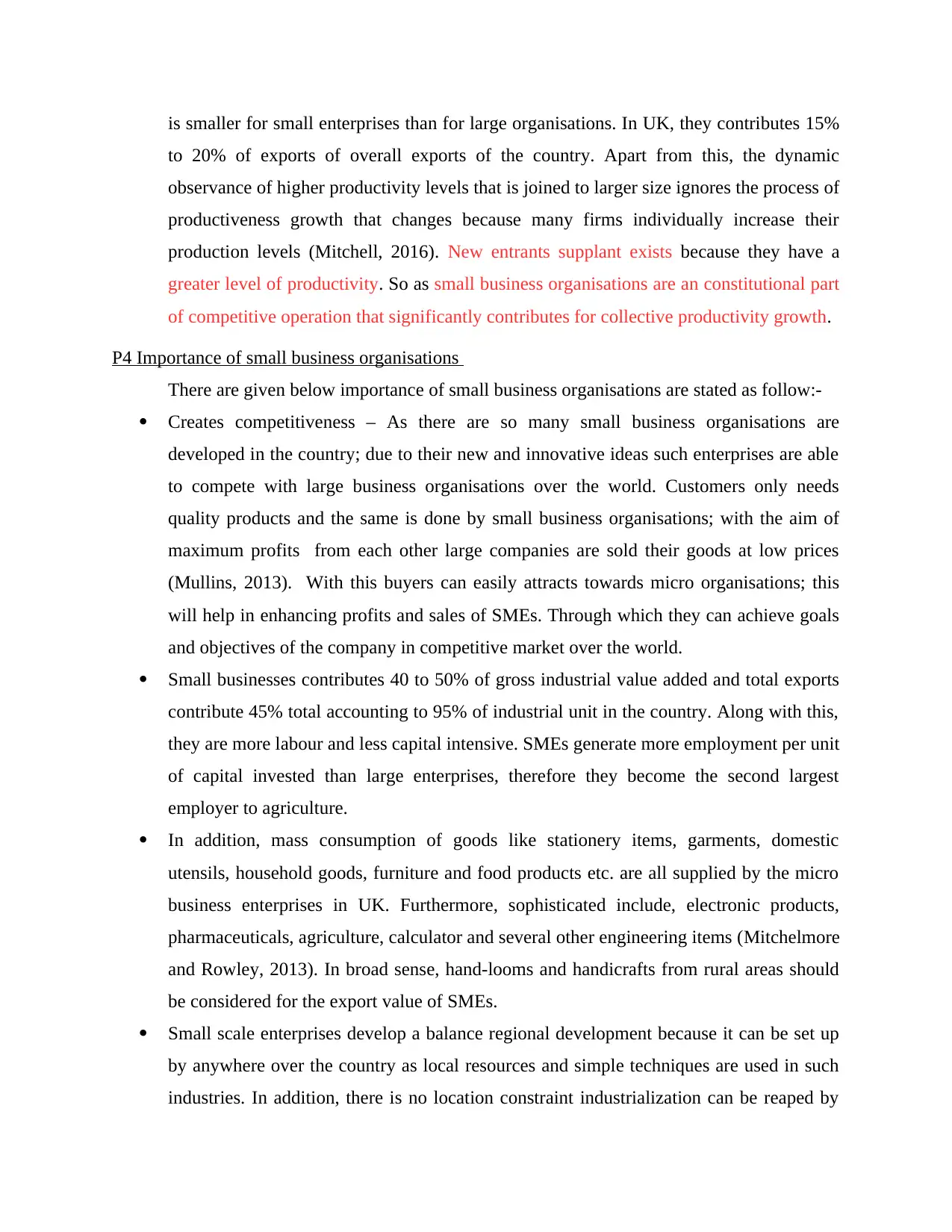
is smaller for small enterprises than for large organisations. In UK, they contributes 15%
to 20% of exports of overall exports of the country. Apart from this, the dynamic
observance of higher productivity levels that is joined to larger size ignores the process of
productiveness growth that changes because many firms individually increase their
production levels (Mitchell, 2016). New entrants supplant exists because they have a
greater level of productivity. So as small business organisations are an constitutional part
of competitive operation that significantly contributes for collective productivity growth.
P4 Importance of small business organisations
There are given below importance of small business organisations are stated as follow:-
Creates competitiveness – As there are so many small business organisations are
developed in the country; due to their new and innovative ideas such enterprises are able
to compete with large business organisations over the world. Customers only needs
quality products and the same is done by small business organisations; with the aim of
maximum profits from each other large companies are sold their goods at low prices
(Mullins, 2013). With this buyers can easily attracts towards micro organisations; this
will help in enhancing profits and sales of SMEs. Through which they can achieve goals
and objectives of the company in competitive market over the world.
Small businesses contributes 40 to 50% of gross industrial value added and total exports
contribute 45% total accounting to 95% of industrial unit in the country. Along with this,
they are more labour and less capital intensive. SMEs generate more employment per unit
of capital invested than large enterprises, therefore they become the second largest
employer to agriculture.
In addition, mass consumption of goods like stationery items, garments, domestic
utensils, household goods, furniture and food products etc. are all supplied by the micro
business enterprises in UK. Furthermore, sophisticated include, electronic products,
pharmaceuticals, agriculture, calculator and several other engineering items (Mitchelmore
and Rowley, 2013). In broad sense, hand-looms and handicrafts from rural areas should
be considered for the export value of SMEs.
Small scale enterprises develop a balance regional development because it can be set up
by anywhere over the country as local resources and simple techniques are used in such
industries. In addition, there is no location constraint industrialization can be reaped by
to 20% of exports of overall exports of the country. Apart from this, the dynamic
observance of higher productivity levels that is joined to larger size ignores the process of
productiveness growth that changes because many firms individually increase their
production levels (Mitchell, 2016). New entrants supplant exists because they have a
greater level of productivity. So as small business organisations are an constitutional part
of competitive operation that significantly contributes for collective productivity growth.
P4 Importance of small business organisations
There are given below importance of small business organisations are stated as follow:-
Creates competitiveness – As there are so many small business organisations are
developed in the country; due to their new and innovative ideas such enterprises are able
to compete with large business organisations over the world. Customers only needs
quality products and the same is done by small business organisations; with the aim of
maximum profits from each other large companies are sold their goods at low prices
(Mullins, 2013). With this buyers can easily attracts towards micro organisations; this
will help in enhancing profits and sales of SMEs. Through which they can achieve goals
and objectives of the company in competitive market over the world.
Small businesses contributes 40 to 50% of gross industrial value added and total exports
contribute 45% total accounting to 95% of industrial unit in the country. Along with this,
they are more labour and less capital intensive. SMEs generate more employment per unit
of capital invested than large enterprises, therefore they become the second largest
employer to agriculture.
In addition, mass consumption of goods like stationery items, garments, domestic
utensils, household goods, furniture and food products etc. are all supplied by the micro
business enterprises in UK. Furthermore, sophisticated include, electronic products,
pharmaceuticals, agriculture, calculator and several other engineering items (Mitchelmore
and Rowley, 2013). In broad sense, hand-looms and handicrafts from rural areas should
be considered for the export value of SMEs.
Small scale enterprises develop a balance regional development because it can be set up
by anywhere over the country as local resources and simple techniques are used in such
industries. In addition, there is no location constraint industrialization can be reaped by
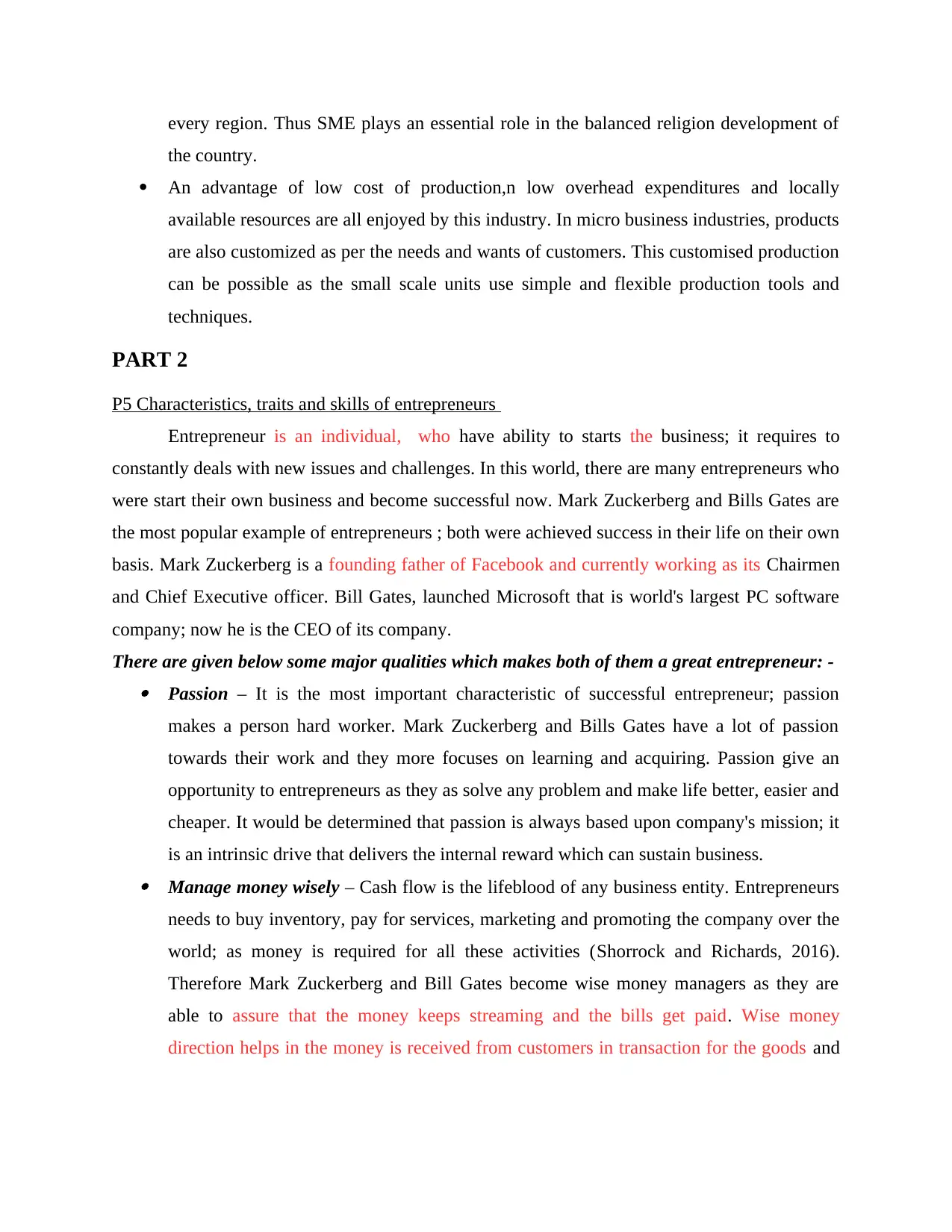
every region. Thus SME plays an essential role in the balanced religion development of
the country.
An advantage of low cost of production,n low overhead expenditures and locally
available resources are all enjoyed by this industry. In micro business industries, products
are also customized as per the needs and wants of customers. This customised production
can be possible as the small scale units use simple and flexible production tools and
techniques.
PART 2
P5 Characteristics, traits and skills of entrepreneurs
Entrepreneur is an individual, who have ability to starts the business; it requires to
constantly deals with new issues and challenges. In this world, there are many entrepreneurs who
were start their own business and become successful now. Mark Zuckerberg and Bills Gates are
the most popular example of entrepreneurs ; both were achieved success in their life on their own
basis. Mark Zuckerberg is a founding father of Facebook and currently working as its Chairmen
and Chief Executive officer. Bill Gates, launched Microsoft that is world's largest PC software
company; now he is the CEO of its company.
There are given below some major qualities which makes both of them a great entrepreneur: - Passion – It is the most important characteristic of successful entrepreneur; passion
makes a person hard worker. Mark Zuckerberg and Bills Gates have a lot of passion
towards their work and they more focuses on learning and acquiring. Passion give an
opportunity to entrepreneurs as they as solve any problem and make life better, easier and
cheaper. It would be determined that passion is always based upon company's mission; it
is an intrinsic drive that delivers the internal reward which can sustain business. Manage money wisely – Cash flow is the lifeblood of any business entity. Entrepreneurs
needs to buy inventory, pay for services, marketing and promoting the company over the
world; as money is required for all these activities (Shorrock and Richards, 2016).
Therefore Mark Zuckerberg and Bill Gates become wise money managers as they are
able to assure that the money keeps streaming and the bills get paid. Wise money
direction helps in the money is received from customers in transaction for the goods and
the country.
An advantage of low cost of production,n low overhead expenditures and locally
available resources are all enjoyed by this industry. In micro business industries, products
are also customized as per the needs and wants of customers. This customised production
can be possible as the small scale units use simple and flexible production tools and
techniques.
PART 2
P5 Characteristics, traits and skills of entrepreneurs
Entrepreneur is an individual, who have ability to starts the business; it requires to
constantly deals with new issues and challenges. In this world, there are many entrepreneurs who
were start their own business and become successful now. Mark Zuckerberg and Bills Gates are
the most popular example of entrepreneurs ; both were achieved success in their life on their own
basis. Mark Zuckerberg is a founding father of Facebook and currently working as its Chairmen
and Chief Executive officer. Bill Gates, launched Microsoft that is world's largest PC software
company; now he is the CEO of its company.
There are given below some major qualities which makes both of them a great entrepreneur: - Passion – It is the most important characteristic of successful entrepreneur; passion
makes a person hard worker. Mark Zuckerberg and Bills Gates have a lot of passion
towards their work and they more focuses on learning and acquiring. Passion give an
opportunity to entrepreneurs as they as solve any problem and make life better, easier and
cheaper. It would be determined that passion is always based upon company's mission; it
is an intrinsic drive that delivers the internal reward which can sustain business. Manage money wisely – Cash flow is the lifeblood of any business entity. Entrepreneurs
needs to buy inventory, pay for services, marketing and promoting the company over the
world; as money is required for all these activities (Shorrock and Richards, 2016).
Therefore Mark Zuckerberg and Bill Gates become wise money managers as they are
able to assure that the money keeps streaming and the bills get paid. Wise money
direction helps in the money is received from customers in transaction for the goods and
⊘ This is a preview!⊘
Do you want full access?
Subscribe today to unlock all pages.

Trusted by 1+ million students worldwide
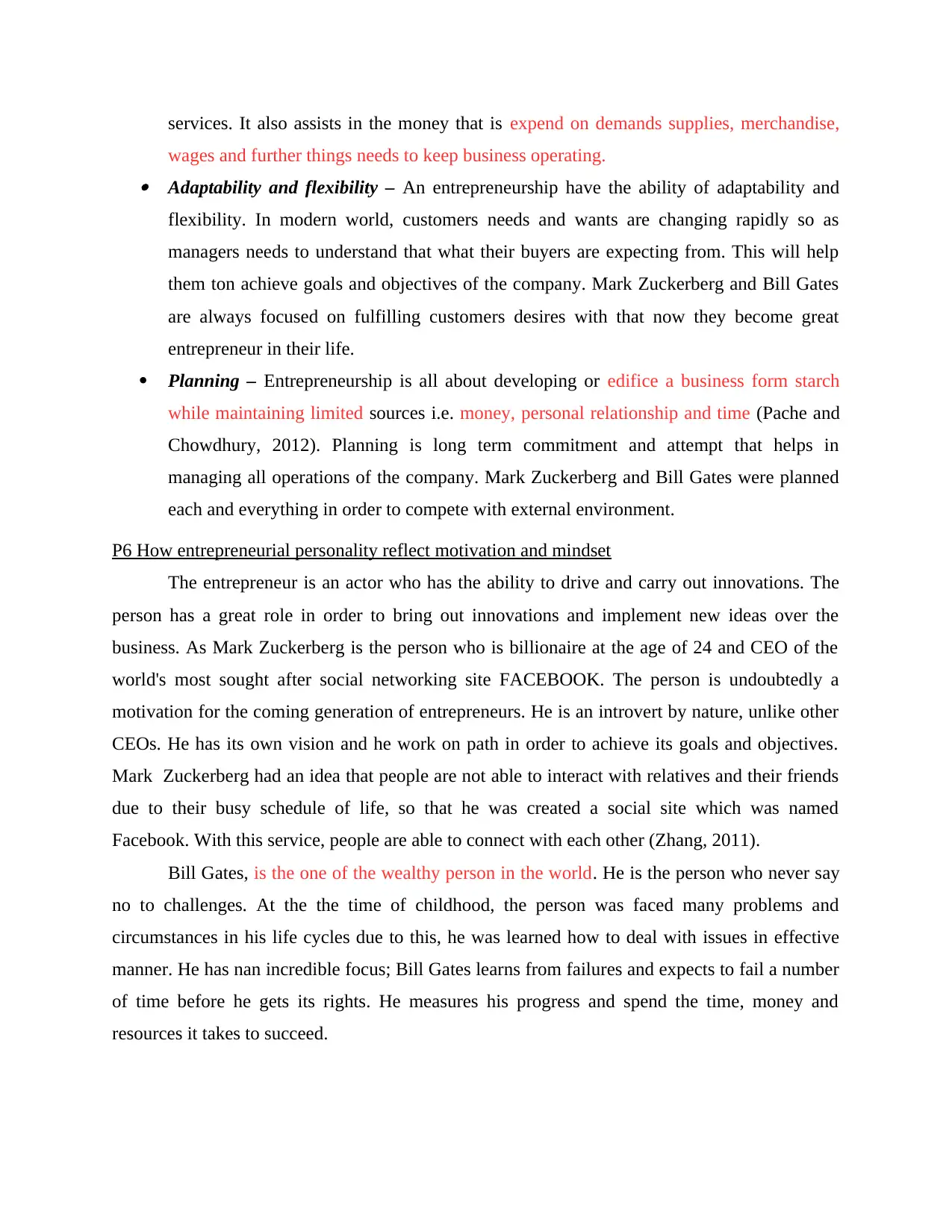
services. It also assists in the money that is expend on demands supplies, merchandise,
wages and further things needs to keep business operating. Adaptability and flexibility – An entrepreneurship have the ability of adaptability and
flexibility. In modern world, customers needs and wants are changing rapidly so as
managers needs to understand that what their buyers are expecting from. This will help
them ton achieve goals and objectives of the company. Mark Zuckerberg and Bill Gates
are always focused on fulfilling customers desires with that now they become great
entrepreneur in their life.
Planning – Entrepreneurship is all about developing or edifice a business form starch
while maintaining limited sources i.e. money, personal relationship and time (Pache and
Chowdhury, 2012). Planning is long term commitment and attempt that helps in
managing all operations of the company. Mark Zuckerberg and Bill Gates were planned
each and everything in order to compete with external environment.
P6 How entrepreneurial personality reflect motivation and mindset
The entrepreneur is an actor who has the ability to drive and carry out innovations. The
person has a great role in order to bring out innovations and implement new ideas over the
business. As Mark Zuckerberg is the person who is billionaire at the age of 24 and CEO of the
world's most sought after social networking site FACEBOOK. The person is undoubtedly a
motivation for the coming generation of entrepreneurs. He is an introvert by nature, unlike other
CEOs. He has its own vision and he work on path in order to achieve its goals and objectives.
Mark Zuckerberg had an idea that people are not able to interact with relatives and their friends
due to their busy schedule of life, so that he was created a social site which was named
Facebook. With this service, people are able to connect with each other (Zhang, 2011).
Bill Gates, is the one of the wealthy person in the world. He is the person who never say
no to challenges. At the the time of childhood, the person was faced many problems and
circumstances in his life cycles due to this, he was learned how to deal with issues in effective
manner. He has nan incredible focus; Bill Gates learns from failures and expects to fail a number
of time before he gets its rights. He measures his progress and spend the time, money and
resources it takes to succeed.
wages and further things needs to keep business operating. Adaptability and flexibility – An entrepreneurship have the ability of adaptability and
flexibility. In modern world, customers needs and wants are changing rapidly so as
managers needs to understand that what their buyers are expecting from. This will help
them ton achieve goals and objectives of the company. Mark Zuckerberg and Bill Gates
are always focused on fulfilling customers desires with that now they become great
entrepreneur in their life.
Planning – Entrepreneurship is all about developing or edifice a business form starch
while maintaining limited sources i.e. money, personal relationship and time (Pache and
Chowdhury, 2012). Planning is long term commitment and attempt that helps in
managing all operations of the company. Mark Zuckerberg and Bill Gates were planned
each and everything in order to compete with external environment.
P6 How entrepreneurial personality reflect motivation and mindset
The entrepreneur is an actor who has the ability to drive and carry out innovations. The
person has a great role in order to bring out innovations and implement new ideas over the
business. As Mark Zuckerberg is the person who is billionaire at the age of 24 and CEO of the
world's most sought after social networking site FACEBOOK. The person is undoubtedly a
motivation for the coming generation of entrepreneurs. He is an introvert by nature, unlike other
CEOs. He has its own vision and he work on path in order to achieve its goals and objectives.
Mark Zuckerberg had an idea that people are not able to interact with relatives and their friends
due to their busy schedule of life, so that he was created a social site which was named
Facebook. With this service, people are able to connect with each other (Zhang, 2011).
Bill Gates, is the one of the wealthy person in the world. He is the person who never say
no to challenges. At the the time of childhood, the person was faced many problems and
circumstances in his life cycles due to this, he was learned how to deal with issues in effective
manner. He has nan incredible focus; Bill Gates learns from failures and expects to fail a number
of time before he gets its rights. He measures his progress and spend the time, money and
resources it takes to succeed.
Paraphrase This Document
Need a fresh take? Get an instant paraphrase of this document with our AI Paraphraser
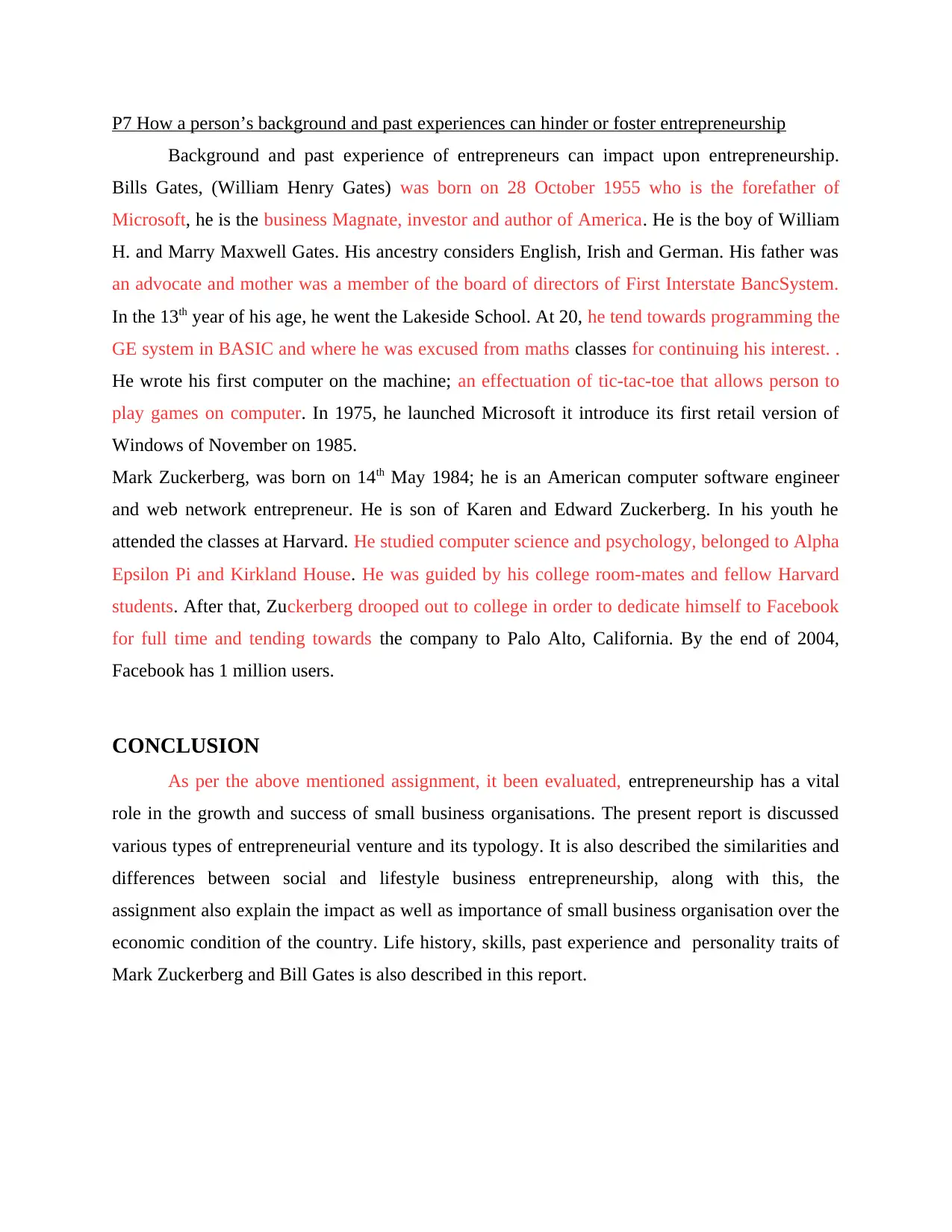
P7 How a person’s background and past experiences can hinder or foster entrepreneurship
Background and past experience of entrepreneurs can impact upon entrepreneurship.
Bills Gates, (William Henry Gates) was born on 28 October 1955 who is the forefather of
Microsoft, he is the business Magnate, investor and author of America. He is the boy of William
H. and Marry Maxwell Gates. His ancestry considers English, Irish and German. His father was
an advocate and mother was a member of the board of directors of First Interstate BancSystem.
In the 13th year of his age, he went the Lakeside School. At 20, he tend towards programming the
GE system in BASIC and where he was excused from maths classes for continuing his interest. .
He wrote his first computer on the machine; an effectuation of tic-tac-toe that allows person to
play games on computer. In 1975, he launched Microsoft it introduce its first retail version of
Windows of November on 1985.
Mark Zuckerberg, was born on 14th May 1984; he is an American computer software engineer
and web network entrepreneur. He is son of Karen and Edward Zuckerberg. In his youth he
attended the classes at Harvard. He studied computer science and psychology, belonged to Alpha
Epsilon Pi and Kirkland House. He was guided by his college room-mates and fellow Harvard
students. After that, Zuckerberg drooped out to college in order to dedicate himself to Facebook
for full time and tending towards the company to Palo Alto, California. By the end of 2004,
Facebook has 1 million users.
CONCLUSION
As per the above mentioned assignment, it been evaluated, entrepreneurship has a vital
role in the growth and success of small business organisations. The present report is discussed
various types of entrepreneurial venture and its typology. It is also described the similarities and
differences between social and lifestyle business entrepreneurship, along with this, the
assignment also explain the impact as well as importance of small business organisation over the
economic condition of the country. Life history, skills, past experience and personality traits of
Mark Zuckerberg and Bill Gates is also described in this report.
Background and past experience of entrepreneurs can impact upon entrepreneurship.
Bills Gates, (William Henry Gates) was born on 28 October 1955 who is the forefather of
Microsoft, he is the business Magnate, investor and author of America. He is the boy of William
H. and Marry Maxwell Gates. His ancestry considers English, Irish and German. His father was
an advocate and mother was a member of the board of directors of First Interstate BancSystem.
In the 13th year of his age, he went the Lakeside School. At 20, he tend towards programming the
GE system in BASIC and where he was excused from maths classes for continuing his interest. .
He wrote his first computer on the machine; an effectuation of tic-tac-toe that allows person to
play games on computer. In 1975, he launched Microsoft it introduce its first retail version of
Windows of November on 1985.
Mark Zuckerberg, was born on 14th May 1984; he is an American computer software engineer
and web network entrepreneur. He is son of Karen and Edward Zuckerberg. In his youth he
attended the classes at Harvard. He studied computer science and psychology, belonged to Alpha
Epsilon Pi and Kirkland House. He was guided by his college room-mates and fellow Harvard
students. After that, Zuckerberg drooped out to college in order to dedicate himself to Facebook
for full time and tending towards the company to Palo Alto, California. By the end of 2004,
Facebook has 1 million users.
CONCLUSION
As per the above mentioned assignment, it been evaluated, entrepreneurship has a vital
role in the growth and success of small business organisations. The present report is discussed
various types of entrepreneurial venture and its typology. It is also described the similarities and
differences between social and lifestyle business entrepreneurship, along with this, the
assignment also explain the impact as well as importance of small business organisation over the
economic condition of the country. Life history, skills, past experience and personality traits of
Mark Zuckerberg and Bill Gates is also described in this report.
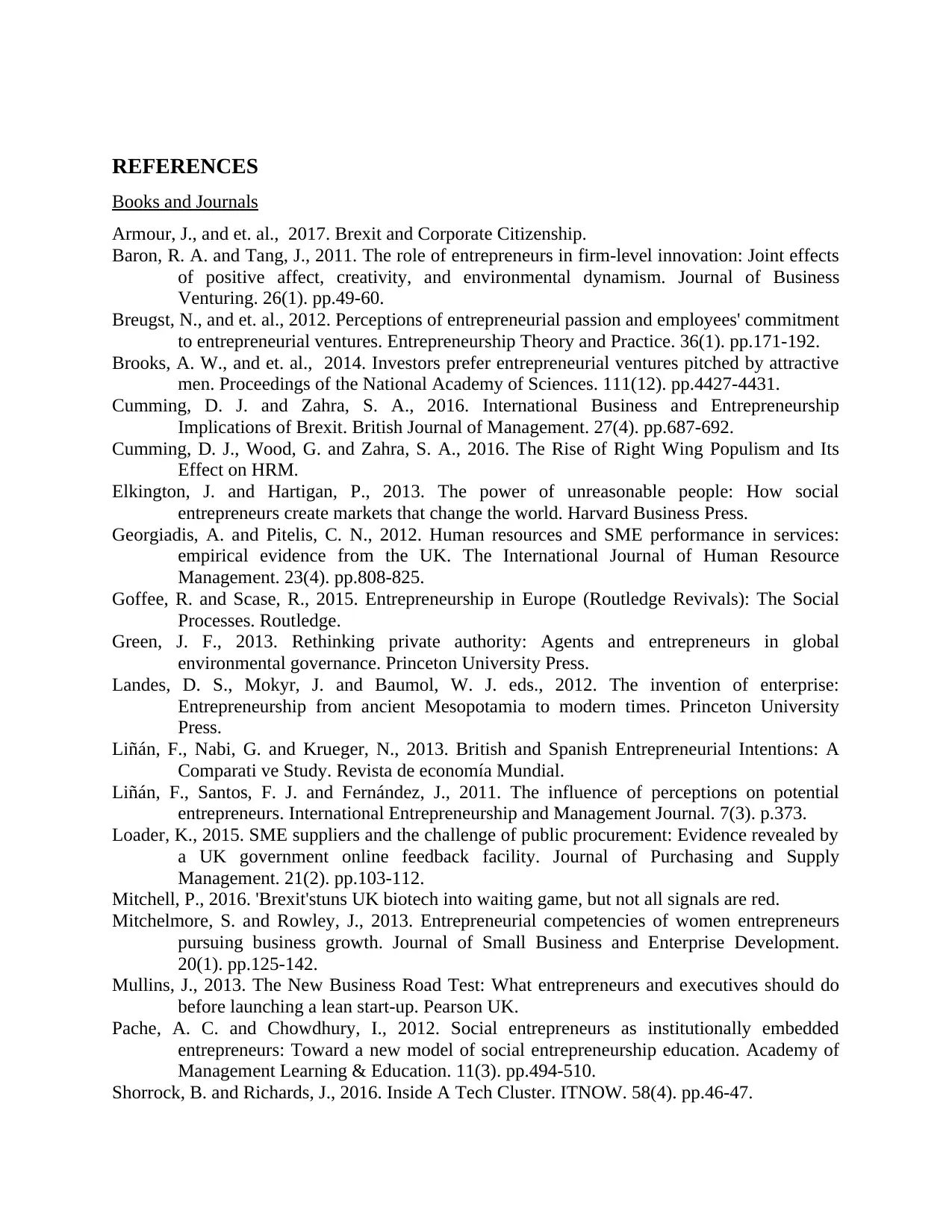
REFERENCES
Books and Journals
Armour, J., and et. al., 2017. Brexit and Corporate Citizenship.
Baron, R. A. and Tang, J., 2011. The role of entrepreneurs in firm-level innovation: Joint effects
of positive affect, creativity, and environmental dynamism. Journal of Business
Venturing. 26(1). pp.49-60.
Breugst, N., and et. al., 2012. Perceptions of entrepreneurial passion and employees' commitment
to entrepreneurial ventures. Entrepreneurship Theory and Practice. 36(1). pp.171-192.
Brooks, A. W., and et. al., 2014. Investors prefer entrepreneurial ventures pitched by attractive
men. Proceedings of the National Academy of Sciences. 111(12). pp.4427-4431.
Cumming, D. J. and Zahra, S. A., 2016. International Business and Entrepreneurship
Implications of Brexit. British Journal of Management. 27(4). pp.687-692.
Cumming, D. J., Wood, G. and Zahra, S. A., 2016. The Rise of Right Wing Populism and Its
Effect on HRM.
Elkington, J. and Hartigan, P., 2013. The power of unreasonable people: How social
entrepreneurs create markets that change the world. Harvard Business Press.
Georgiadis, A. and Pitelis, C. N., 2012. Human resources and SME performance in services:
empirical evidence from the UK. The International Journal of Human Resource
Management. 23(4). pp.808-825.
Goffee, R. and Scase, R., 2015. Entrepreneurship in Europe (Routledge Revivals): The Social
Processes. Routledge.
Green, J. F., 2013. Rethinking private authority: Agents and entrepreneurs in global
environmental governance. Princeton University Press.
Landes, D. S., Mokyr, J. and Baumol, W. J. eds., 2012. The invention of enterprise:
Entrepreneurship from ancient Mesopotamia to modern times. Princeton University
Press.
Liñán, F., Nabi, G. and Krueger, N., 2013. British and Spanish Entrepreneurial Intentions: A
Comparati ve Study. Revista de economía Mundial.
Liñán, F., Santos, F. J. and Fernández, J., 2011. The influence of perceptions on potential
entrepreneurs. International Entrepreneurship and Management Journal. 7(3). p.373.
Loader, K., 2015. SME suppliers and the challenge of public procurement: Evidence revealed by
a UK government online feedback facility. Journal of Purchasing and Supply
Management. 21(2). pp.103-112.
Mitchell, P., 2016. 'Brexit'stuns UK biotech into waiting game, but not all signals are red.
Mitchelmore, S. and Rowley, J., 2013. Entrepreneurial competencies of women entrepreneurs
pursuing business growth. Journal of Small Business and Enterprise Development.
20(1). pp.125-142.
Mullins, J., 2013. The New Business Road Test: What entrepreneurs and executives should do
before launching a lean start-up. Pearson UK.
Pache, A. C. and Chowdhury, I., 2012. Social entrepreneurs as institutionally embedded
entrepreneurs: Toward a new model of social entrepreneurship education. Academy of
Management Learning & Education. 11(3). pp.494-510.
Shorrock, B. and Richards, J., 2016. Inside A Tech Cluster. ITNOW. 58(4). pp.46-47.
Books and Journals
Armour, J., and et. al., 2017. Brexit and Corporate Citizenship.
Baron, R. A. and Tang, J., 2011. The role of entrepreneurs in firm-level innovation: Joint effects
of positive affect, creativity, and environmental dynamism. Journal of Business
Venturing. 26(1). pp.49-60.
Breugst, N., and et. al., 2012. Perceptions of entrepreneurial passion and employees' commitment
to entrepreneurial ventures. Entrepreneurship Theory and Practice. 36(1). pp.171-192.
Brooks, A. W., and et. al., 2014. Investors prefer entrepreneurial ventures pitched by attractive
men. Proceedings of the National Academy of Sciences. 111(12). pp.4427-4431.
Cumming, D. J. and Zahra, S. A., 2016. International Business and Entrepreneurship
Implications of Brexit. British Journal of Management. 27(4). pp.687-692.
Cumming, D. J., Wood, G. and Zahra, S. A., 2016. The Rise of Right Wing Populism and Its
Effect on HRM.
Elkington, J. and Hartigan, P., 2013. The power of unreasonable people: How social
entrepreneurs create markets that change the world. Harvard Business Press.
Georgiadis, A. and Pitelis, C. N., 2012. Human resources and SME performance in services:
empirical evidence from the UK. The International Journal of Human Resource
Management. 23(4). pp.808-825.
Goffee, R. and Scase, R., 2015. Entrepreneurship in Europe (Routledge Revivals): The Social
Processes. Routledge.
Green, J. F., 2013. Rethinking private authority: Agents and entrepreneurs in global
environmental governance. Princeton University Press.
Landes, D. S., Mokyr, J. and Baumol, W. J. eds., 2012. The invention of enterprise:
Entrepreneurship from ancient Mesopotamia to modern times. Princeton University
Press.
Liñán, F., Nabi, G. and Krueger, N., 2013. British and Spanish Entrepreneurial Intentions: A
Comparati ve Study. Revista de economía Mundial.
Liñán, F., Santos, F. J. and Fernández, J., 2011. The influence of perceptions on potential
entrepreneurs. International Entrepreneurship and Management Journal. 7(3). p.373.
Loader, K., 2015. SME suppliers and the challenge of public procurement: Evidence revealed by
a UK government online feedback facility. Journal of Purchasing and Supply
Management. 21(2). pp.103-112.
Mitchell, P., 2016. 'Brexit'stuns UK biotech into waiting game, but not all signals are red.
Mitchelmore, S. and Rowley, J., 2013. Entrepreneurial competencies of women entrepreneurs
pursuing business growth. Journal of Small Business and Enterprise Development.
20(1). pp.125-142.
Mullins, J., 2013. The New Business Road Test: What entrepreneurs and executives should do
before launching a lean start-up. Pearson UK.
Pache, A. C. and Chowdhury, I., 2012. Social entrepreneurs as institutionally embedded
entrepreneurs: Toward a new model of social entrepreneurship education. Academy of
Management Learning & Education. 11(3). pp.494-510.
Shorrock, B. and Richards, J., 2016. Inside A Tech Cluster. ITNOW. 58(4). pp.46-47.
⊘ This is a preview!⊘
Do you want full access?
Subscribe today to unlock all pages.

Trusted by 1+ million students worldwide
1 out of 14
Related Documents
Your All-in-One AI-Powered Toolkit for Academic Success.
+13062052269
info@desklib.com
Available 24*7 on WhatsApp / Email
![[object Object]](/_next/static/media/star-bottom.7253800d.svg)
Unlock your academic potential
Copyright © 2020–2026 A2Z Services. All Rights Reserved. Developed and managed by ZUCOL.





